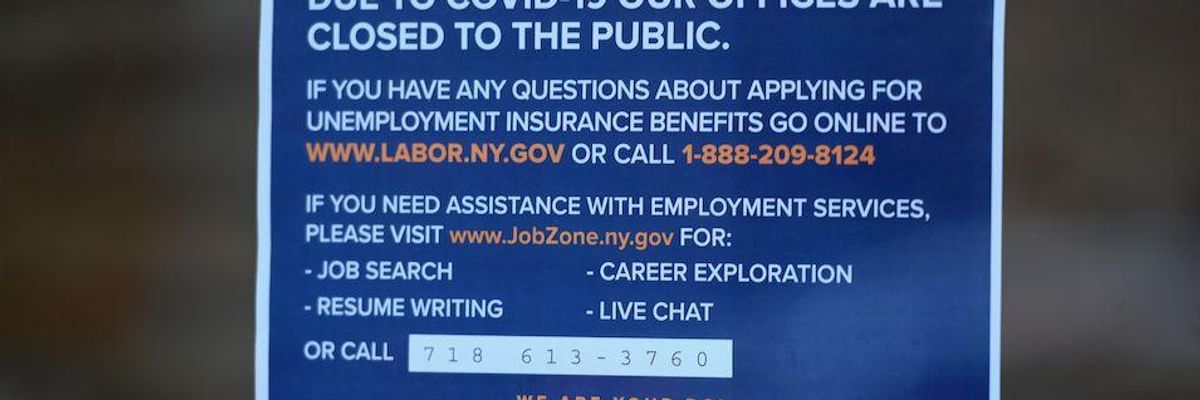
A sign is seen in front of the closed Department of Labor on March 25, 2020 in New York. (Photo: Angela Weiss/AFP via Getty Images)
Unprecedented Surge in US Unemployment Claims Cause State Government Servers to Crash
Deal reached in the Senate, says Chuck Schumer, contains "unemployment insurance on steroids" to help with the crisis.
A drastic spike in unemployment across the U.S. is causing state servers to crash as an unprecedented number of Americansfile claims due to the economic slowdown from the coronavirus outbreak spreading nationwide.
The surge in filings comes even as a bipartisan agreement in the U.S. Senate overnight seeks to provide a significant boost in unemployment benefits to help stem the financial pain of millions who now find themselves out of work.
Unemployment claims across the U.S. are causing state servers to crash as an unprecedented number of Americans seek benefits related to losing work due to the economic slowdown from the coronavirus outbreak that is spreading around the country, even as legislation advancing in Congress provides a spike in funding for those out of work.
"At the end of the day, given the fact that we have an unprecedented economic crisis, some people are suggesting that unemployment might go above 20%, 25% by the end of June, we have an unprecedented health care crisis, it's clear to me that we have got to move as aggressively as we possibly can to protect working families in this country," Sen. Bernie Sanders (I-Vt.) a candidate for the 2020 Democratic presidential nomination, told PBS Newshour's Judy Woodruff on Tuesday.
States across the country are seeing a surge in unemployment insurance claims that are shutting down servers, as Bloomberg reported Wednesday.
"Across America, state-run insurance systems are buckling under the weight of the new coronavirus' economic fallout," reported Bloomberg. "National jobless claims last week saw the biggest spike since the aftermath of Hurricane Sandy eight years ago, jumping 33% to 281,000. This Thursday's figure could be as high as 3 million--quadruple the record set in 1982--according to S&P Global Ratings."
\u201cState unemployment insurance websites are crashing under the COVID strain & many funds are pressed for cash. One reason why everyone should get at least $2,000/month from the feds during the crisis, as Maxine Waters, Bernie Sanders et al have been saying https://t.co/BoR8lI5CPO\u201d— District Sentinel (@District Sentinel) 1585136784
A model from the Economic Policy Institute (EPI) suggests that 3.4 million Americans filed for unemployment insurance last week, the highest number "in American history."
As EPI's Aaron Sojourner and Paul Goldsmith-Pinkham wrote Tuesday, those numbers likely paint an incomplete picture of the scope of the problem:
The number of new unemployment insurance claims is a narrow measure of unemployment and underemployment. Not everyone who is unemployed can claim benefits, and many states' UI offices were overwhelmed by the surge in demand this past week, so not all claims could be accepted. The true impacts are undoubtedly of larger scale than described here. Further, unemployment insurance benefits replace less than half of families' usual income.
The Senate bill, which at $2 trillion is the largest such legislation in history, reportedly contains provisions allowing for extending unemployment insurance for 13 weeks and a four month boost in benefits.
The new benefits, Senate Minority Leader Chuck Schumer (D-N.Y.) said Wednesday, were "unemployment insurance on steroids."
\u201cSen. Chuck Schumer: "This bill... has unemployment\u00a0insurance on steroids."\u201d— The Hill (@The Hill) 1585137660
In a "Dear Colleague" letter (pdf) to his fellow Democrats on Wednesday, Schumer laid out the terms by which unemplyoment benefits were improving.
"The extended UI program in this agreement increases the maximum unemployment benefit by $600 per week and ensures that laid-off workers, on average, will receive their full pay for four months," wrote Schumer. "It ensures that all workers are protected whether they work for businesses small, medium or large, along with self-employed and workers in the gig economy."
EPI delivered more dire news on Wednesday, as researchers Julia Wolfe and David Cooper predicted that by the summer, 14 million Americans will be out of work.
"Congress is debating an economic stimulus package around $2 trillion, and if it is targeted enough, it could help mitigate some of these losses," said Wolfe and Cooper. "Yet even with these measures, many people will still need to remain out of work, potentially for months, in order to stop the virus's spread."
Sanders, in his interview with Woodruff, said that "there will be a massive, unprecedented expansion of unemployment compensation, which includes workers who today are not covered by unemployment" under the bill. The senator added that the top priority for lawmakers remains public health.
"Money is money. Life is life," said Sanders. "People die, you know, that's not what we want. So, the first priority has got to be to protect the health of the American people, and then we have to rebuild the economy."
An Urgent Message From Our Co-Founder
Dear Common Dreams reader, The U.S. is on a fast track to authoritarianism like nothing I've ever seen. Meanwhile, corporate news outlets are utterly capitulating to Trump, twisting their coverage to avoid drawing his ire while lining up to stuff cash in his pockets. That's why I believe that Common Dreams is doing the best and most consequential reporting that we've ever done. Our small but mighty team is a progressive reporting powerhouse, covering the news every day that the corporate media never will. Our mission has always been simple: To inform. To inspire. And to ignite change for the common good. Now here's the key piece that I want all our readers to understand: None of this would be possible without your financial support. That's not just some fundraising cliche. It's the absolute and literal truth. We don't accept corporate advertising and never will. We don't have a paywall because we don't think people should be blocked from critical news based on their ability to pay. Everything we do is funded by the donations of readers like you. Will you donate now to help power the nonprofit, independent reporting of Common Dreams? Thank you for being a vital member of our community. Together, we can keep independent journalism alive when it’s needed most. - Craig Brown, Co-founder |
A drastic spike in unemployment across the U.S. is causing state servers to crash as an unprecedented number of Americansfile claims due to the economic slowdown from the coronavirus outbreak spreading nationwide.
The surge in filings comes even as a bipartisan agreement in the U.S. Senate overnight seeks to provide a significant boost in unemployment benefits to help stem the financial pain of millions who now find themselves out of work.
Unemployment claims across the U.S. are causing state servers to crash as an unprecedented number of Americans seek benefits related to losing work due to the economic slowdown from the coronavirus outbreak that is spreading around the country, even as legislation advancing in Congress provides a spike in funding for those out of work.
"At the end of the day, given the fact that we have an unprecedented economic crisis, some people are suggesting that unemployment might go above 20%, 25% by the end of June, we have an unprecedented health care crisis, it's clear to me that we have got to move as aggressively as we possibly can to protect working families in this country," Sen. Bernie Sanders (I-Vt.) a candidate for the 2020 Democratic presidential nomination, told PBS Newshour's Judy Woodruff on Tuesday.
States across the country are seeing a surge in unemployment insurance claims that are shutting down servers, as Bloomberg reported Wednesday.
"Across America, state-run insurance systems are buckling under the weight of the new coronavirus' economic fallout," reported Bloomberg. "National jobless claims last week saw the biggest spike since the aftermath of Hurricane Sandy eight years ago, jumping 33% to 281,000. This Thursday's figure could be as high as 3 million--quadruple the record set in 1982--according to S&P Global Ratings."
\u201cState unemployment insurance websites are crashing under the COVID strain & many funds are pressed for cash. One reason why everyone should get at least $2,000/month from the feds during the crisis, as Maxine Waters, Bernie Sanders et al have been saying https://t.co/BoR8lI5CPO\u201d— District Sentinel (@District Sentinel) 1585136784
A model from the Economic Policy Institute (EPI) suggests that 3.4 million Americans filed for unemployment insurance last week, the highest number "in American history."
As EPI's Aaron Sojourner and Paul Goldsmith-Pinkham wrote Tuesday, those numbers likely paint an incomplete picture of the scope of the problem:
The number of new unemployment insurance claims is a narrow measure of unemployment and underemployment. Not everyone who is unemployed can claim benefits, and many states' UI offices were overwhelmed by the surge in demand this past week, so not all claims could be accepted. The true impacts are undoubtedly of larger scale than described here. Further, unemployment insurance benefits replace less than half of families' usual income.
The Senate bill, which at $2 trillion is the largest such legislation in history, reportedly contains provisions allowing for extending unemployment insurance for 13 weeks and a four month boost in benefits.
The new benefits, Senate Minority Leader Chuck Schumer (D-N.Y.) said Wednesday, were "unemployment insurance on steroids."
\u201cSen. Chuck Schumer: "This bill... has unemployment\u00a0insurance on steroids."\u201d— The Hill (@The Hill) 1585137660
In a "Dear Colleague" letter (pdf) to his fellow Democrats on Wednesday, Schumer laid out the terms by which unemplyoment benefits were improving.
"The extended UI program in this agreement increases the maximum unemployment benefit by $600 per week and ensures that laid-off workers, on average, will receive their full pay for four months," wrote Schumer. "It ensures that all workers are protected whether they work for businesses small, medium or large, along with self-employed and workers in the gig economy."
EPI delivered more dire news on Wednesday, as researchers Julia Wolfe and David Cooper predicted that by the summer, 14 million Americans will be out of work.
"Congress is debating an economic stimulus package around $2 trillion, and if it is targeted enough, it could help mitigate some of these losses," said Wolfe and Cooper. "Yet even with these measures, many people will still need to remain out of work, potentially for months, in order to stop the virus's spread."
Sanders, in his interview with Woodruff, said that "there will be a massive, unprecedented expansion of unemployment compensation, which includes workers who today are not covered by unemployment" under the bill. The senator added that the top priority for lawmakers remains public health.
"Money is money. Life is life," said Sanders. "People die, you know, that's not what we want. So, the first priority has got to be to protect the health of the American people, and then we have to rebuild the economy."
A drastic spike in unemployment across the U.S. is causing state servers to crash as an unprecedented number of Americansfile claims due to the economic slowdown from the coronavirus outbreak spreading nationwide.
The surge in filings comes even as a bipartisan agreement in the U.S. Senate overnight seeks to provide a significant boost in unemployment benefits to help stem the financial pain of millions who now find themselves out of work.
Unemployment claims across the U.S. are causing state servers to crash as an unprecedented number of Americans seek benefits related to losing work due to the economic slowdown from the coronavirus outbreak that is spreading around the country, even as legislation advancing in Congress provides a spike in funding for those out of work.
"At the end of the day, given the fact that we have an unprecedented economic crisis, some people are suggesting that unemployment might go above 20%, 25% by the end of June, we have an unprecedented health care crisis, it's clear to me that we have got to move as aggressively as we possibly can to protect working families in this country," Sen. Bernie Sanders (I-Vt.) a candidate for the 2020 Democratic presidential nomination, told PBS Newshour's Judy Woodruff on Tuesday.
States across the country are seeing a surge in unemployment insurance claims that are shutting down servers, as Bloomberg reported Wednesday.
"Across America, state-run insurance systems are buckling under the weight of the new coronavirus' economic fallout," reported Bloomberg. "National jobless claims last week saw the biggest spike since the aftermath of Hurricane Sandy eight years ago, jumping 33% to 281,000. This Thursday's figure could be as high as 3 million--quadruple the record set in 1982--according to S&P Global Ratings."
\u201cState unemployment insurance websites are crashing under the COVID strain & many funds are pressed for cash. One reason why everyone should get at least $2,000/month from the feds during the crisis, as Maxine Waters, Bernie Sanders et al have been saying https://t.co/BoR8lI5CPO\u201d— District Sentinel (@District Sentinel) 1585136784
A model from the Economic Policy Institute (EPI) suggests that 3.4 million Americans filed for unemployment insurance last week, the highest number "in American history."
As EPI's Aaron Sojourner and Paul Goldsmith-Pinkham wrote Tuesday, those numbers likely paint an incomplete picture of the scope of the problem:
The number of new unemployment insurance claims is a narrow measure of unemployment and underemployment. Not everyone who is unemployed can claim benefits, and many states' UI offices were overwhelmed by the surge in demand this past week, so not all claims could be accepted. The true impacts are undoubtedly of larger scale than described here. Further, unemployment insurance benefits replace less than half of families' usual income.
The Senate bill, which at $2 trillion is the largest such legislation in history, reportedly contains provisions allowing for extending unemployment insurance for 13 weeks and a four month boost in benefits.
The new benefits, Senate Minority Leader Chuck Schumer (D-N.Y.) said Wednesday, were "unemployment insurance on steroids."
\u201cSen. Chuck Schumer: "This bill... has unemployment\u00a0insurance on steroids."\u201d— The Hill (@The Hill) 1585137660
In a "Dear Colleague" letter (pdf) to his fellow Democrats on Wednesday, Schumer laid out the terms by which unemplyoment benefits were improving.
"The extended UI program in this agreement increases the maximum unemployment benefit by $600 per week and ensures that laid-off workers, on average, will receive their full pay for four months," wrote Schumer. "It ensures that all workers are protected whether they work for businesses small, medium or large, along with self-employed and workers in the gig economy."
EPI delivered more dire news on Wednesday, as researchers Julia Wolfe and David Cooper predicted that by the summer, 14 million Americans will be out of work.
"Congress is debating an economic stimulus package around $2 trillion, and if it is targeted enough, it could help mitigate some of these losses," said Wolfe and Cooper. "Yet even with these measures, many people will still need to remain out of work, potentially for months, in order to stop the virus's spread."
Sanders, in his interview with Woodruff, said that "there will be a massive, unprecedented expansion of unemployment compensation, which includes workers who today are not covered by unemployment" under the bill. The senator added that the top priority for lawmakers remains public health.
"Money is money. Life is life," said Sanders. "People die, you know, that's not what we want. So, the first priority has got to be to protect the health of the American people, and then we have to rebuild the economy."

